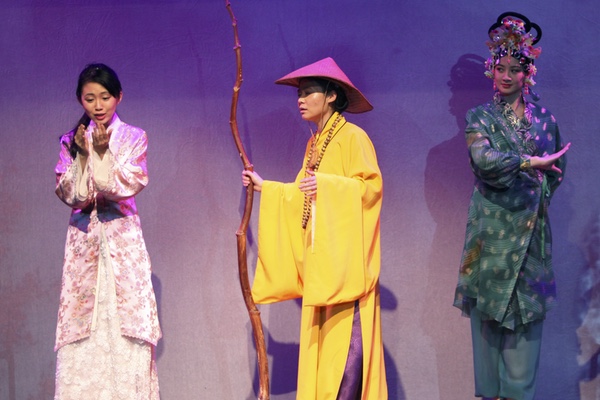Dreaming of Red Pavilions in Eighteenth Century China (Review of a Play)

A Dream of Red Pavilions, by Cao Xueqin, is one of China’s classic novels. Set in the eighteenth century, it tells the tale of a large family that unknowingly takes in two spirits from the spirit world and nurtures them for years. Throughout this time, the family is assaulted with problems and tries to cope as China itself changes under the rule of several Emperors. It is a nicely staged story of triumph and tragedy and would make a great American soap opera, heavy on the tragedy.
The Pan Asian Repertory Theatre, in New York, had Jeremy Tiang adapt the novel to the stage, cutting out a number of characters (there are 300 in the novel) and trimming some scenes to make it work, and work well, for a theater audience. The play just opened at the Clurman Theater on Theater Row, 419 W. 42d Street, in New York. It is a solid adaptation of the novel, with a few bumps here and there, and gives audiences an interesting look at upper class family life in China nearly three hundred years ago.
The first act tells the story of how the spirit world pair, Baoyu and Daiyu, wound up on earth and accidentally together in the same extended family. The pair pines for each other. Baoyu is an educated, charming young man and Daiyu is a beautiful, but a bit jealous, woman. They grow up amid an array of mostly women who manipulate and badger father Jia Zheng, who loses just about all of his battles with the females. The first act traces family life and roles along rather dully, but things pick up in the second act, when all the family’s secrets are revealed and one of Zheng’s daughters is chosen to be a concubine of the Emperor. The family, astonishingly, sees this as the greatest triumph imaginable and treats the woman like a movie star upon her visit to the family. Her presence in court also protects the family, which is involved in all sorts of chicanery, it turns out.
There are not enough plays about Chinese history. We need more. This one, as an example, tells you a lot about family life and the deplorable positions of women in China who are not concubines or royals. They have no rights at all in an era where, particularly in the United States and England, feminism was starting to thrive. And, too, the political and cultural intrigue that envelops the family in act two are right out of a Hollywood soap opera (Netflix House of Cards is child’s play compared to what the Zhengs do, including loansharking). China is a huge player on the world stage these days. Any tiny wrinkle in its economy shakes up the stock market and they are a major political force. We need to know a lot about the Chinese and we can do that through studying their history. Hence we need more plays about China.
The staging of the play, although a bit constricted in the small theater, is pretty good. The acting is first rate, with Vichet Chum as Baoyu and Kelsey Wang as Daiyu heading up a talented cast. Directors Tisa Chang and Lu Yu have done a good job, even though act one is a bit stodgy and the plot is hard to follow. The costumes by Hyun Sook Kim, are sumptuous, but the sets are too sparse and the lighting uneven. The play, with a number of characters, could use a larger staging and more of a grand, epic look.
Adapter Tiang also needs to put in more Chinese history. The story is set in the eighteenth century and a lot was going on in China at that time. The country was ruled by the Qing Dynasty, that took over in the middle of the seventeenth century and was the last imperial dynasty of China, ruling until 1912. From 1750 to the late 1790s, the time of this play, the Qing generals were victorious in ten military campaigns that extended China’s boundaries well into Central Asia. The Qing rulers were often corrupt and a low tax base did not provide them with sufficient funds to run the empire well. Over those years China was hit with several recessions. The country’s population grew during this time, reaching some 400 million by the early days of the twentieth century.
It was during this time, too, that America began to trade with China. Following the American Revolution, the U.S. made Samuel Shaw, a retired Continental Army officer, its first China Consul. He arrived in China in 1784, set up offices and began to participate in trade with China, mainly involving China’s vast tea production. Some more of this story should have been told in the play.
A Dream of Red Pavilions, a novel that was the basis for several movies and operas in China itself, has moved to the stage nicely.
PRODUCTION: The play is produced by the Pan Asian Repertory Theatre. Sets: Sheryl Liu, Costumes: Hyun Shook Kim, Lighting: Victor En Yu Tan, Music: angel Lam Chinese Language and Culture: Lu Yu. The play is directed by Tisa Chang and Lu Yu.